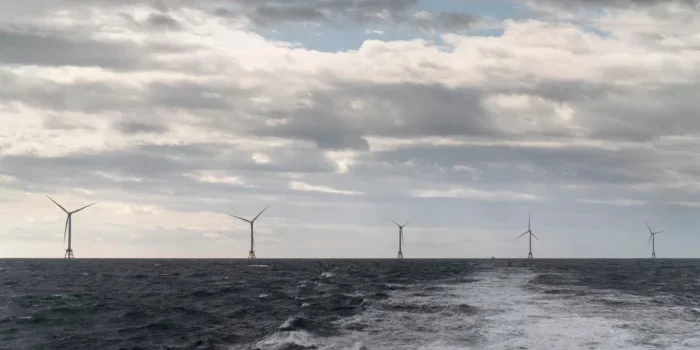(Victor Skinner, The Center Square) The U.S. Department of Defense is raising concerns about the Biden administration’s “highly problematic” plans for wind projects off the Atlantic coast, citing potential conflicts with the Dare County bombing range used to train fighter jet crews and other operations.
Maps shared with industry stakeholders that were first reported by Bloomberg News show large portions of areas the Interior Department earmarked for off-shore wind leases last year shaded in red, illustrating areas deemed “highly problematic” for the Navy and Air Force.
The Defense Department contends wind turbines attached to the Atlantic seabed would create challenges for military operations and facilities nearby, including the Dare County bombing range and a Yorktown, Virginia, weapons station.
The conflicts involve four of six potential wind lease areas identified by the Interior’s Bureau of Ocean Energy Management last year that are highly problematic shaded red, and two tracts in yellow that will require further study.
The situation poses serious problems for President Joe Biden’s goal of installing 30 gigawatts of off-shore wind power by 2030, as well as plans in Atlantic coast states to develop wind farms as a means of meeting clean energy goals.
In North Carolina, Gov. Roy Cooper has touted wind energy as a key to meeting the state’s goal of reducing greenhouse gas emissions by 70% below 2005 levels by 2030, and to attain carbon neutrality by 2050.
Cooper signed an executive order in 2021 to establish offshore wind development goals of 2.8 gigawatts off the North Carolina coast by 2030 and 8 gigawatts by 2040.
“Offshore wind power will help North Carolina create jobs and generate economic development while helping us transition to a clean energy economy,” Cooper said when he unveiled the goals. “North Carolina’s national leadership in clean energy and manufacturing plus our highly trained workforce create a strong business environment for offshore wind supply chain and manufacturing companies.”
Cooper estimated the industry would invest $140 billion in projects from North Carolina up the Atlantic coast by 2036.
The Bureau of Ocean Energy Management last year awarded two roughly 55,000 square acre tracts south of Bald Head Island to Duke Energy and TotalEnergies for wind development, adding to another off the northern Outer Banks awarded to Avangrid Renewables.
Data from the U.S. Department of Energy shows North Carolina is home to more than 20 active wind-related manufacturing facilities.
The bureau said in a statement the agency “has a long working relationship” with the Department of Defense and “together we have successfully deconflicted and identified areas that have resulted in 27 leases along the Atlantic coast, covering over 2.1 million acres,” Bloomberg reports. “We will continue this collaboration as we week to identify new lease areas in the central Atlantic.”
An unnamed senior Defense Department official also told the news site the Pentagon is committed to working with the bureau to resolve the issues. The department is now focused on finding ways to accommodate wind development, which could involve changing operations, such as shifting the location of military exercises or optimizing equipment to avoid interference from turbines.
The Interior Department planned to sell new offshore wind rights in the area next year. Similar conflicts between military operations and off-shore wind leasing along the California coast in 2019 took several years to resolve.
“Earlier this year, other members of the North Carolina delegation and I encouraged a whole-of-government approach to offshore wind leasing that includes input from various ocean users in the Carolinas and Central Atlantic coast, including the Department of Defense which operates important training operations off the coast of North Carolina,” said Congresswoman Deborah Ross in an email to The Center Square.
“While it’s clear that we still have more work and stakeholder consultation ahead, I am confident that the Bureau of Ocean Energy Management and the Biden administration will work together with the Department of Defense and other federal agencies to advance offshore wind development and mitigate concerns from various ocean users, including our military.”

